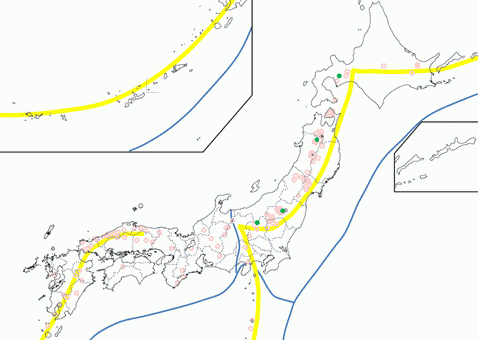Kuroko Massive Sulfide Deposit
Chemical Process (Liquid-phase Growth) - Under water
Synonym
Kuroko deposit, Bimodal-Felsic type volcanogenic massive sulfide deposit
Synonym
Volcanogenic massive sulfide deposit (semi-interpretative term), Stratabound massive sulfide deposit (descriptive), Stratiform massive sulfide deposit (descriptive), Volcanic-associated massive sulfide deposit (descriptive), Volcanic-hosted massive sulfide deposit (descriptive), Submarine exhalative sedimentary deposit (interpretative)
Required Geological Setting
Associated metasomatic zones
High-T silicified zone, Illite-Chlorite zone, Interstratified mineral zone
Occurrence
A type of volcanic massive sulfide deposits associated with felsic volcanic rocks.
Host of the deposit: Felsic volcanic rocks >> Mafic volcanic rocks > Siliciclastic rocks (Sedimentary rocks)
The host of deposits is composed of large amount of felsic volcanic rocks with minor mafic volcanic rocks and little siliciclastic sedimentary rocks such as shale. Felsic volcanic rocks are generally calc-alkaline ryolite to dacite. The deposit is concordant with the sedimentary structure of the host, and is considered to be formed on the ocean floor of back-arc basins at continental margins. Chalcopyrite-Pyrite veins are intruded in the felsic volcanic complex at the bottom of the deposit associated with sericite-chlorite-quartz alteration zones, which are covered with the gypsum and carbonates layer. The gypsum and carbonate layer underlies conformably massive sulfides composed of chalcopyrite, sphalerite, galena, and pyrite. The massive sulfide is covered with the barite layer. The whole deposit is again covered with volcanic and volcaniclastic rocks. Gold tends to be included at the upper part of deposits.

Distribution of Kuroko Massive Sulfide Deposits described in this site. Yellow lines are volcanic fronts, and blue lines are plate boundaries.
Mineral Assemblages (Kuroko ore "Black ore")
Chalcopyrite, Galena, Sphalerite, Tetrahedrite
Mineral Assemblages (Oko ore "Yellow ore")
Pyrite
Mineral Assemblages (Gangue)
Quartz, Gypsum, Baryte, Sericite, Chlorite
Localities
- Kosaka Mine (Tertiary,Sulfide)
- Hanawa Mine (Tertiary,Sulfide)
- Hanaoka Mine (Tertiary,Sulfide)
- Toya Mine (Tertiary,Sulfide)
- Takara Mine (Funnel structure,Sulfide)
- Asahi Mine (Tertiary,Gypsum)